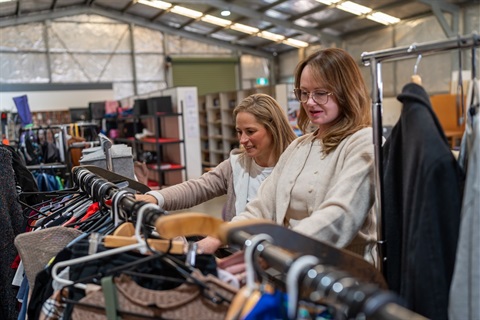Clothing

A lot of clothing and textile waste ends up in landfill, but there are ways to reduce your fashion footprint.
Australians send around $500 million in fashion clothing to the tip each year. More than 95 per cent of this can be recycled or reused.
The fashion industry contributes to around 10% of global greenhouse gas emissions due to its long supply chains and energy intensive production. The industry consumes more energy than the international flights and shipping industry combined. Learn more about this issue in the textiles industry.
Textiles are the most carbon-intensive material per tonne, so small change can have a big impact. Here are some ways to reduce, reuse and recycle unwanted clothing.
Darebin Preloved Clothing Trail
Our Preloved Clothing Trail is your guide to buying from and donating to your local op shops and preloved shops.
View the Preloved Clothing Trail(PDF, 4MB)
Think before you buy
Avoid
Ask yourself these questions before you buy clothes:
- Do you really need what you're buying?
- Can you rent, borrow or swap clothing?
- Will you wear the clothes much?
Renting and borrowing are great for one-off events like weddings. Online platforms can connect you to lenders of clothes for special occasions. That way you can look great while spending less.
Cost is also important. A new $10 shirt is probably low-quality and may be fast fashion, so it won't last long and will end up in landfill.
A good test of clothing quality is considering how much you'd like to be paid to make an item.
Reduce
If you asked the above questions and still want to buy new clothes, check that they were made with ethical and environmental considerations. Here are some questions to consider:
- Are the people who made your clothes paid and treated fairly?
- Where was the clothing made?
- Is the clothing made from natural fibres (like cotton, bamboo, wool or denim), or fossil fuel–based fibres (like plastics, polyester and nylon)?
Reuse
Here are some great ways to reuse clothes and minimise your fashion footprint:
- Buy second-hand clothes – find a local op shop.
- Swap clothes – a swap party is a fun and sustainable way to refresh your wardrobe. See the ABC's War on Waste resource kit to find out how to run a swap party.
- Mend clothes – visit the Darebin Repair Cafe Facebook page to find a repair workshop. There are lots of great mending tips and tricks online, and clothing repair stores can help with more complex issues.
What to do with unwanted clothes
Sell
Donate
- Give away your clothes to friends and family.
- Give to local op shops in Darebin.
- Use online platforms, such as:
Upcycle
Clothes that have reached their end of life can be composted in your home compost if they are natural fibres. Otherwise, they should be placed in the general waste bin.